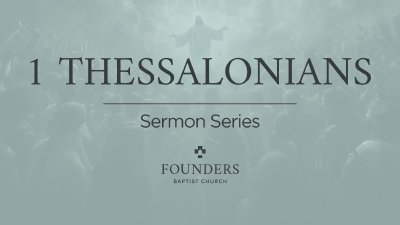Introduction:
Paul is encouraging the Thessalonians. He is rejoicing over them and encouraging them at the same time. And as he does this, he tells them of his prayers for them.
He tells them that he remembers them, he regularly prays for them, and that his prayers include GREAT THANKS for what he has seen in them and heard about them.
He is thanking God because they are God’s work.
He is thanking God because the work that he has carried out among them is proving to be fruitful.
He is thanking God because God is glorified by what God has produced.
A LESSON ABOUT PRAYER AND THANKSGIVING
From what Paul writes we not only get insight into the apostle’s prayer life — how he prayed for others — we learn some valuable lessons about what should characterize our own spirit in prayer.
EFFECTIVE PRAYER IS A MEANS OF MUTUAL ENCOURAGEMENT
The first thing I want to point out is the most obvious. We asked in our first study why someone would begin a letter by telling others of what he has seen in them, heard about them, knows about them. We noted how it serves as a means of encouragement, and challenge, and protection (the devil’s work of convincing people we DON’T really care about them).
Well, one of the ways that we encourage each other is by the ministry of prayer.
Is there anything more encouraging than the knowledge that we are in someone’s heart, on someone’s mind, in the most effectual way they could ever participate in our lives — prayer?
People cannot always be with us, but they can always pray for us.
People cannot always identify with our challenges, but they can lift our needs before the throne of the one who PERFECTLY knows our challenges.
People do not always have the resources to meet the needs represented in our lives, but they can beseech the one who owns all things and directs all things.
One of the greatest ways that we could ever encourage each other, challenge each other, and protect each other, is by the knowledge that we pray for each other.
EFFECTIVE PRAYER INVOLVES REMEMBRANCE
Perhaps one of our real weaknesses in prayer is that we don’t take time to remember. We fall prey to the lie that activity is more meaningful than intercession. We get busy. We get moving. We don’t really think, we don’t really reflect.
We don’t take the time to call the things to mind that SHOULD be in our prayer life, and that WOULD be in our prayer life, if we DID take time to remember.
We should say with David the Psalmist:
ESV Psalm 103:1 Of David. Bless the LORD, O my soul, and all that is within me, bless his holy name! 2 Bless the LORD, O my soul, and forget not all his benefits, 3 who forgives all your iniquity, who heals all your diseases, 4 who redeems your life from the pit, who crowns you with steadfast love and mercy, 5 who satisfies you with good so that your youth is renewed like the eagle's.
Why the exhortation not to forget? Because even God’s people forget.
Question: Have you ever had the experience of watching someone who is oblivious to things they should recognize? Have you ever witnessed someone else’s disconnect with reality?
DO YOU EVER RECOGNIZE THAT IN SOME AREA OF LIFE — THAT’S YOU?
NAS Isaiah 1:2 Listen, O heavens, and hear, O earth; For the LORD speaks, "Sons I have reared and brought up, But they have revolted against Me. 3 "An ox knows its owner, And a donkey its master's manger, But Israel does not know, My people do not understand."
We are not always in the dark in the rebellious way that Isaiah describes. Sometimes we are just insensitive in a way that is neglectful, in a way that is not circumspect and aware.
One of the essential elements to the kind of prayer life that Paul knew is that we take time to remember PEOPLE.
PAUL IS GIVING THANKS FOR GOD’S PEOPLE IN OUR VERSES.
He is giving thanks for the fruit OF GOD’S OWN ACTIVITY IN THE WORLD.
QUESTION: When is the last time you thought to praise God for what you see IN SOMEONE ELSE’S LIFE?
So, effective prayer involves remembrance.





